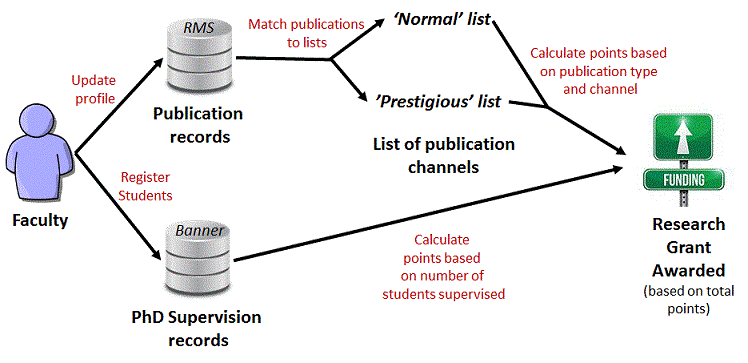Green Belt project update: OBRSS II
By Dimitrios-Stavros Kapetanakis, Research Systems Analyst, UCD Research and Innovation
Research activity is critical to our reputation as a leading international university. The University recognises that commitment to excellent research builds UCD’s reputation. We also recognise that many of the day-to-day costs of research activity are not covered by research grants. In recognition of this, we have developed the Output-Based Research Support Scheme (OBRSS) to disburse research support funds to faculty based on their research outputs, as captured through publications and PhD supervision.

The scheme was initiated in 2016, after the successful completion of a Green Belt project led by Liam Cleere, UCD Research. It was repeated in 2017 and is now part of the annual internal research funding model. OBRSS assigns points for each publication (with weighted scores for more prestigious publication channels) and PhD student supervised. Points are translated into a monetary amount of research support delivered as a research grant, funded from university funds.
In parallel, UCD is implementing a new and improved Research Information Management System to replace its current system. The new system will become the definitive source of research information for the 2018 OBRSS.
This project will lead to an incremental reduction of data errors and duplicate entries, hence a leaner process and a reduction in the time spent administrating the OBRSS. The project will also examine the effectiveness of the overarching goal of the scheme i.e. to stimulate the authorship of more publications in quality publication outlets.
This project will also analyse the spending patterns on the OBRSS grants. It is envisaged, that this analysis will provide insights on the effectiveness of the scheme and moreover suggestions will be made on how individual academics that have not yet done so, could spend their grants.
The opportunity with this project is to reduce the amount of time spent manually cleansing source data for the OBRSS and to analyse and understand if the OBRSS grants are being utilised by the academics.
Preliminary results from the deduplication of the data reveal a duplication rate of approximately 10% existing at the current dataset. Furthermore, preliminary results of the data analysis indicate that 31% of the total OBRSS grant budget has been spent with 35% of the time elapsed. At the same time 50% of the academics have not spent anything from their grant to date.
Finally, ambitious targets are set to reduce the publication data duplication rate to as close as possible to 0% and motivating at least 25% more academics to use their OBRSS grant, by using targeted communications which will feature examples on how the awards could be spent.
